We're moving to a new pagepublished at 06:43 GMT 13 January 2024
For technical reasons, our live coverage of the attacks on Houthi targets in Yemen is moving to a new page.
Please join us there.
The US launched a fresh strike against a Houthi target in Yemen overnight
The attack targeted a radar site with Tomahawk missiles launched from a warship, the US military says
The military describes the attack as a "follow-on action" from Friday's wider US-UK strikes, which targeted nearly 30 locations
Earlier, President Biden warned the US would respond if the Houthis continued "outrageous behaviour" in attacking Red Sea shipping
But the Iran-backed group says attacks in Yemen will not go without "punishment or retaliation", vowing to continue attacking ships
The Houthis' drone and rocket attacks on vessels have forced major firms to reroute their ships, raising fears fuel prices will rise and supply chains will be damaged
The militants, who control a large part of Yemen, claim their strikes on Red Sea ships are in support of Gaza
Edited by Nathan Williams and Francesca Gillett
For technical reasons, our live coverage of the attacks on Houthi targets in Yemen is moving to a new page.
Please join us there.
 Gem O'Reilly
Gem O'Reilly
Live reporter
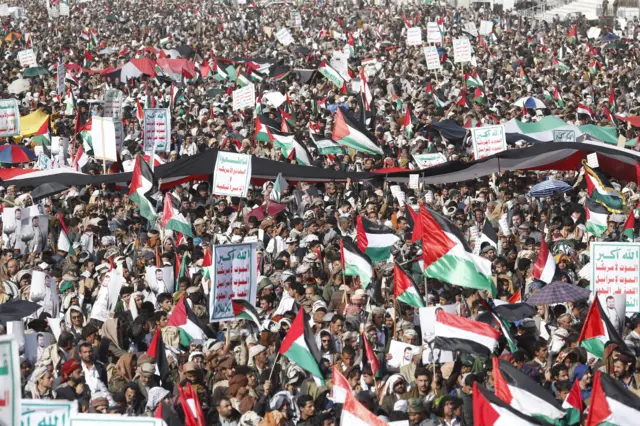 Image source, EPA
Image source, EPAProtests have been taking place in Yemen over the US and UK strikes
It's been a busy few hours for our teams in London and Washington, following the US strike development in Yemen.
If you're just joining us, here is what's been happening:
 Will Vernon
Will Vernon
BBC News, Washington
The US Central Command suggested this Houthi radar station was not a new target – in the statement, the strike was described as a "follow-on action" after the previous night’s attacks.
Hours earlier, President Biden had warned the US would respond if the Houthis continued what he called their "outrageous behaviour".
These fresh strikes are unlikely to result in any significant escalation in the region – this was clearly nowhere near on the same scale as the coordinated strikes on Thursday night, when around 30 Houthi-controlled sites were targeted by US-led forces.
President Biden has called the military action "a success".
But what the Houthis do next - and whether the US and its allies take any further action - will show whether Biden is right.
US strikes in Yemen: 'This was to send a message to the Houthis'
A retired US colonel has been talking to the BBC about the likely US goals with its missile attacks on Yemen.
Colonel Brendan Kearney says the strikes were probably designed to "send a message" to the Houthis for their failure to listen to the warnings that "have been given to them".
He adds that if the group start firing missiles at maritime shipping then they'll be "a new round of attacks on Yemen".
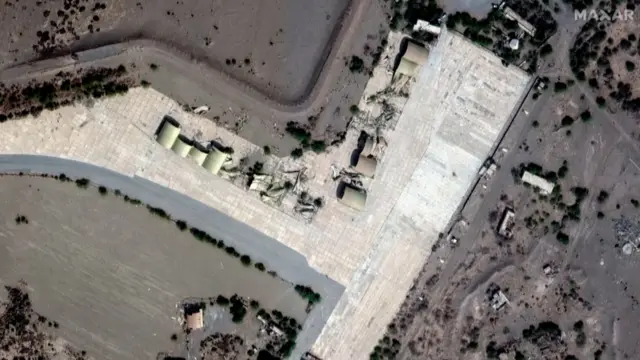 Image source, Maxar Technologies
Image source, Maxar TechnologiesThis image was taken in Hodeidah before the strikes
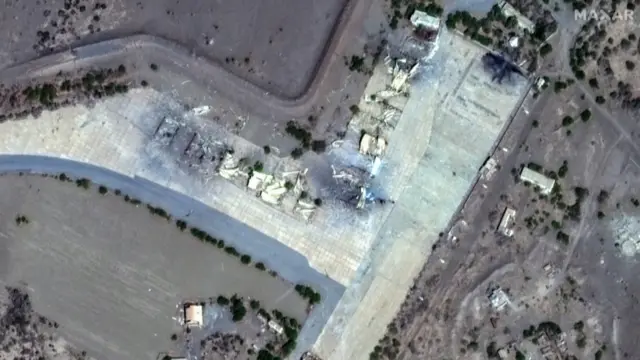 Image source, Maxar Technologies
Image source, Maxar TechnologiesThis image was taken after the strikes in Hodeidah
Satellite images captured by Maxar Technologies show the impact of the US and UK strikes in Yemen on Friday.
In the images you can see damage to airports and other structures in the same spots in the city of Hodeidah, compared with satellite images from previous years.
As a reminder, US and UK jets and warships launched dozens of airstrikes across Yemen against Houthi sites.
UK PM Rishi Sunak has said it was done "in self-defence" after months of attacks on Red Sea shipping.
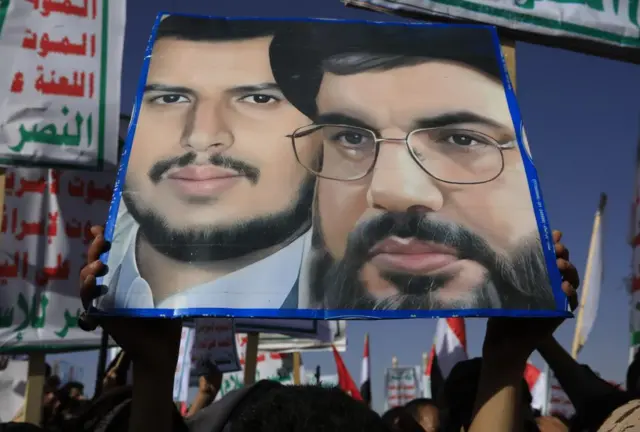 Image source, AHYA ARHAB/EPA-EFE/REX/Shutterstock
Image source, AHYA ARHAB/EPA-EFE/REX/ShutterstockA poster of the Houthi and Hezbollah leaders at a protest in Yemen
Dr Elisabeth Kendall, a specialist on Yemen at Cambridge University, says "we should not imagine that the Houthis operate entirely by logic".
Dr Kendall, speaking before news of the latest US strike on Yemen's capital, told BBC Radio 4's The Briefing Room on Friday: "They really do believe that God is on their side... there's emotion and religious belief that needs to come into this equation."
Dr Kendall also said the relationship between the Houthis and Iran exists because their interests align.
The Houthi movement was formed in the 1990s to combat what they saw as the corruption of the then-president of Yemen, Ali Abdullah Saleh. Since 2014, they have been fighting a civil war against the government.
Hezbollah has been providing them with extensive military expertise and training, external, according to the US research institute, the Combating Terrorism Center.
Iran is suspected of supplying the Houthis with weapons but has denied involvement in the Red Sea attacks.
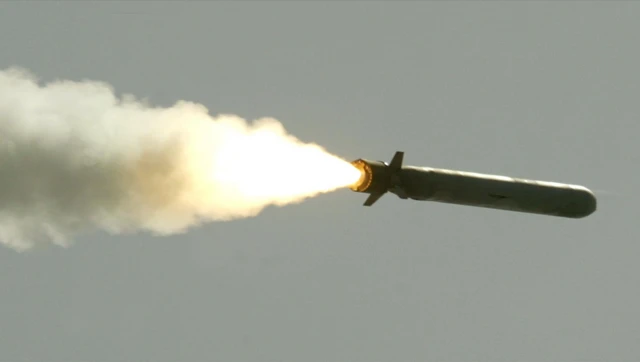 Image source, Getty Images
Image source, Getty ImagesA Tomahawk missile seen here flying towards Iraq from the Red Sea in 2003
Tomahawks are land attack cruise missiles which are GPS-guided and can be programmed to fly evasively, the US military says.
They are long-range and primarily used by the US Navy and Royal Navy in ship and submarine-based land-attack operations.
They are designed to fly at extremely low altitudes at high subsonic speeds, according to the US Naval Air Systems Command.
The first operational use from the US was during Operation Desert Storm in the Gulf War in 1991.
We've just been hearing from the US military, which has confirmed it conducted a strike against a Houthi radar site in Yemen.
The strike took place at 03:45 local time (00:45 GMT) on Saturday and was carried out by USS Carney - a navy warship based in the Red Sea which has previously shot down drones fired from Houthi-held Yemen.
The radar site was hit by Tomahawk missiles, the military said in a statement.
It was a "follow-on action" on a specific military target associated with strikes taken on 12 January and designed to "degrade the Houthi’s ability to attack maritime vessels, including commercial vessels", the statement added.

As we've previously reported, major shipping firms have been diverting their cargo away from the Red Sea ever since the Houthis first launched their attacks.
These images compare the movements of container ships in November, just after the first attack on a commercial vessel, with the situation today.
You can see how many ships are now taking the longer route around southern Africa's Cape of Good Hope.
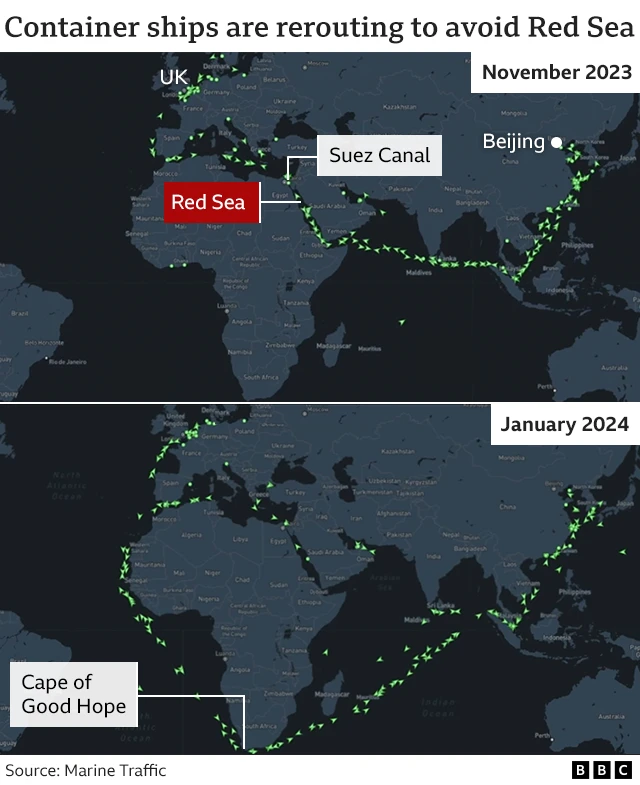
There has been less of a reduction in oil and gas tankers using the Red Sea route, according to data from the Marine Traffic website, but the International Association of Independent Tanker Owners (Intertanko) has advised shipping to avoid passing through the area if possible, and to turn off their transmitters if they do so.
It’s also interesting to note that some ships passing the Yemen coast are listing no destination, or “no contact with Israel”. Others are declaring “armed guards on board”.
Details are still emerging of the latest US strike against the Houthis in Yemen.
A Houthi-run TV channel Al-Masirah is reporting that Yemen's capital Sanaa, which is held by Houthi rebels, has been targeted.
"The American-British enemy is targeting the capital, Sanaa, with a number of raids," the channel posted on X, formerly Twitter, citing its correspondent in the city.
Associated Press journalists in Sanaa heard one loud explosion.
NBC and AP are also reporting the new strike in Yemen.
It was carried out by the US from a Navy ship, one unnamed official told NBC.
Two officials told AP the US targeted a radar site that was still determined to present a threat to maritime traffic.
The BBC is chasing confirmation of this from the Pentagon.
It comes a day after the US and UK targeted nearly 30 Houthi locations in retaliation for the Yemeni rebels attacking vessels in the Red Sea.
The US is carrying out another strike against Houthis in Yemen, according to American media.
CNN and Reuters news agency are quoting unnamed US officials.
It comes minutes after the Houthi TV channel Al-Masirah reported early on Saturday that raids had targeted the country's capital Sanaa.
We'll bring you more information as we get it.
 Image source, EPA
Image source, EPAShapps and Sunak have argued that the UK was "acting in self-defence"
UK Defence Secretary Grant Shapps has called on Iran to urge its allies to "cease and desist" after the UK and US launched airstrikes against the Houthi rebels in Yemen.
In an interview with the Daily Telegraph, external, Shapps warned the world is "running out of patience" with Tehran.
He called for it to be "clearer with its many proxies" in the Middle East.
"You must get the Houthi rebels," he said, "others who are acting as proxies for you, Lebanese Hezbollah are obvious examples, some in Iraq and Syria, you must get these different organisations to cease and desist.
"We see you, we see through what you're doing. We see how you're doing it, particularly the Houthi rebels, and no good can come from it."
 Image source, Reuters
Image source, ReutersA driver fills up in Alexandria, Virginia
Joe Biden also said in Allentown, Pennsylvania, that he is "very concerned" about the impact the war in the Middle East will have on oil prices.
Oil rose by 1% on Friday after the UK and US launched dozens of air strikes across Yemen on Houthi targets and a number of oil tankers diverted course from the Red Sea.
After speaking of his concern around rising oil prices, Biden added: "That's why we got to stop it."
Inflation and petrol/oil prices may be key issues during this year's presidential election.
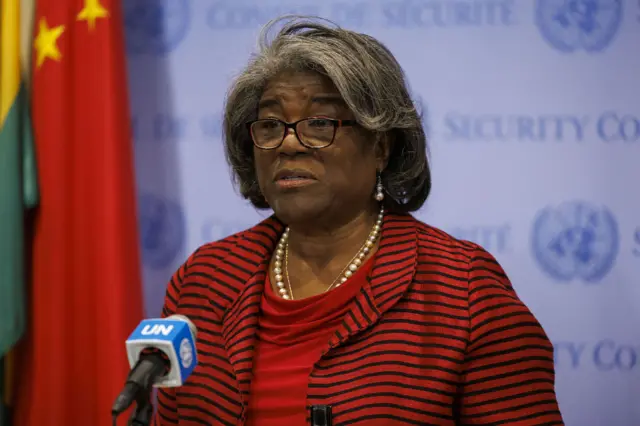 Image source, EPA
Image source, EPALinda Thomas-Greenfield said that more than 2,000 ships had been forced to divert as a result of the attacks
The UK and US have defended their action to carry out strikes against the Houthis in retaliation for the Yemeni rebel group's attacks on ships in the Red Sea and the Gulf of Aden.
Both have said the strikes are legal under international military law.
US Ambassador to the UN Linda Thomas-Greenfield told the UN Security Council the strikes were "to disrupt and degrade the Houthis' ability to continue the reckless attacks against vessels and commercial shipping".
She added more than 2,000 ships had been forced by the Houthi attacks to divert from the Red Sea since November.
Prime Minister Rishi Sunak has insisted the UK and US acted "in self-defence" and that allies would not hesitate to ensure the safety of commercial shipping.
The US president was asked about the Middle East crisis and Defence Secretary Lloyd Austin’s health while visiting a coffee shop in Pennsylvania.
Biden vows retaliation against Houthis if attacks continue
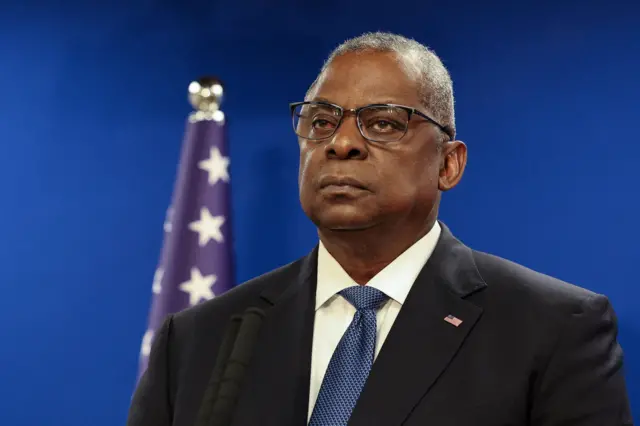 Image source, Reuters
Image source, ReutersAustin had a "minimally invasive" surgery to treat prostate cancer in December 2023
With the US now embroiled in three theatres of conflict from the Middle East to Ukraine, the head of the Pentagon has been facing calls to resign after he failed to disclose his serious illness.
The White House says Joe Biden only learnt of Defence Secretary Lloyd Austin's prostate cancer diagnosis just before he made it public on Wednesday.
The president was asked on Friday by reporters if he remained confident in Austin's leadership, to which Biden replied: "I do".
The top cabinet member, aged 70, did not disclose a hospital visit in late December, for which he had surgery to treat his condition. Neither did he notify the White House about his admission to intensive care on New Year's Day to treat complications from the procedure.
According to the Pentagon and White House, Austin continued to carry out his duties from his hospital bed as the US and UK launched military strikes against the Houthi rebel group in Yemen.
Maj Gen Pat Ryder, a Pentagon spokesperson, told BBC News that Austin "gave the order to the US Central Command commander to go ahead and execute the strikes".
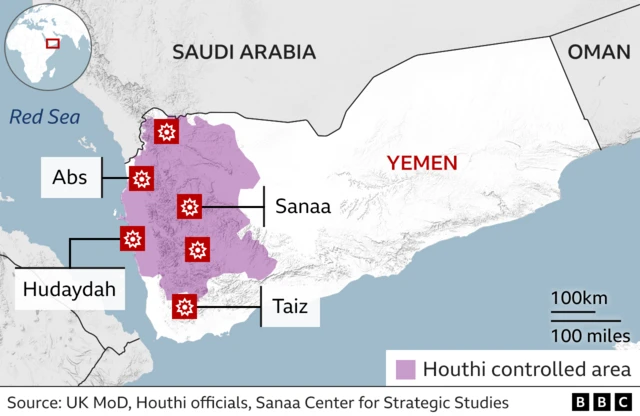 Image source, .
Image source, .Locations of US-UK air strikes in Yemen
It's 18:00 in Washington DC, 23:00 in London and 02:00 in Sanaa, Yemen.
If you're just joining us, here's a reminder of the main lines we've been covering since the US and UK launched strikes early Friday on Houthi targets in Yemen:
The Pentagon's press secretary has just spoken to the BBC.
Maj Gen Patrick Ryder said the US does not want to see an "extension of the conflict in Gaza, broader into the region, and we'll continue to work hard on that".
He added that, at the same time, the US "can't allow the Houthis to continue to conduct these attacks".
Pentagon: ‘Important to separate’ US involvement in regional conflict
 Image source, Reuters
Image source, ReutersDemonstrators in Allentown
Dozens of demonstrators lined the streets as the Biden motorcade visited the Allentown Fire Training Academy.
There was what one journalist described as a notable police presence, with some officers carrying shields.
Protesters could be heard chanting "peace right now", "we will remember in November" as well as "no vote for genocide Joe", according to White House pool reporters.
The 2024 US presidential election is in November this year.